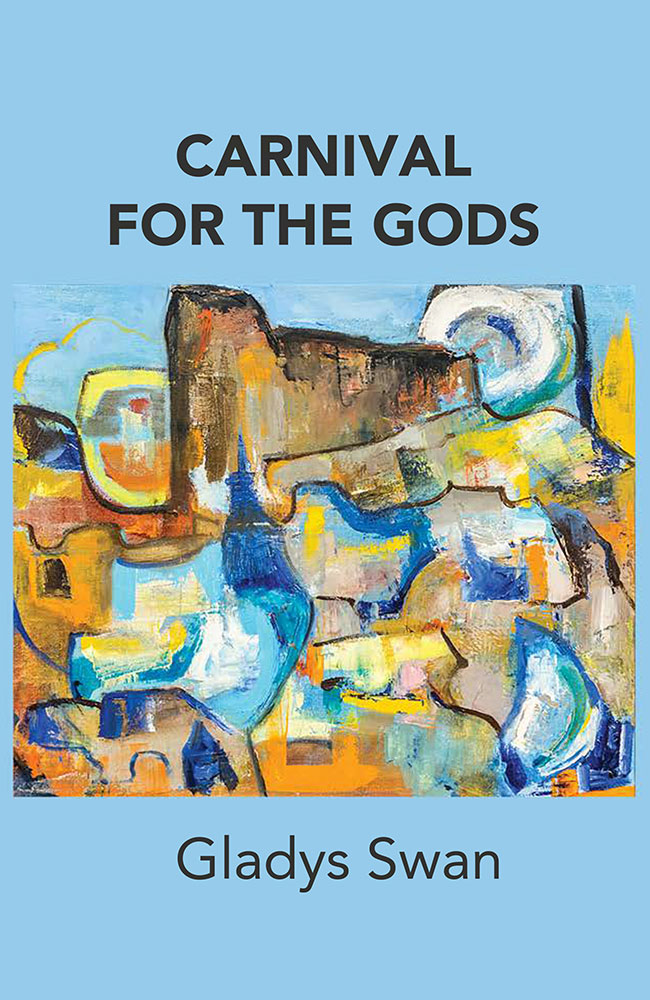Publishers of international
prose, poetry, art,
and literary hybrids.
Book
Carnival for the Gods
A small rag-tag circus/carnival breaks down in the desert in southern New Mexico after a dust storm. Various members of the troupe begin to pull out—this latest disaster the last straw. Those now left have been faithful followers of Dusty, the owner, together with his long-suffering wife, Alta, former trapeze artists, with their dream of creating a show greater than The Greatest Show on Earth, a giant celebration at the heart of the city. Those left have nowhere else to go: Donovan, a giant; Curran, a midget: Billy Bigelow, a magician-cum-handyman and electrician. Into this scene of general disarray, Dusty brings Amazing Grace, who dances with snakes, and the Kid, who might be her brother. She is the one, Dusty is convinced, who will change their luck.
This novel is the first of Gladys Swan’s Carnival Quintet. All five novels are available from Serving House Books: Small Wonder, Dancing with Snakes, The Dream Seekers, and Down to Earth.
In addition to the Quintet, she has also published a Western Trilogy with Serving House Books: Ancestors, A Dark Gamble, and Ghost Dance.
Author: Gladys Swan
Paperback : 244 pages
ISBN-10 : 1947175181
ISBN-13 : 978-1947175181
About the Author
In her efforts to explore what the imagination can offer as a way of knowing, Gladys Swan has published The Carnival Quintet, a trilogy of novels set in New Mexico, and eight collections of short fiction. The two most recent collections are The Tiger’s Eye—New & Selected Stories, and Jungle, ten stories from the Sewanee Review. Her efforts extend to creating the cover paintings for a number of her books, as well as exhibiting her art work. Her fiction, poetry, and essays have been published in various literary publications here and in Europe.
The glimmer of hope cherished by Dusty, the leader of the carnival, and his wife Alta, fades early in this gentle allegory when the troupe becomes stranded on a New Mexico highway. Even when Dusty breaks through his normally cool reserve and backhands Alta for the first time, though, members of the moribund company only fathom their fate for moments at a time; taking their stage illusions home, they deceive themselves with uncharacteristic professionalism. Happiest are troupe members like Billy, who invariably returns to the ground after flirting with grandeur. In one chapter, Billy hopes to defy gravity and become the “Master of Up”; in the next, he confesses, “I’m a now you see it now you don’t man–coins and cards and scarfs.” Billy is the only troupe member to seek consolation from within, though, so when the wandering performers arrive in surrealistic “Ventura City,” they’re seduced by the city’s pink Moorish castles, rainbow-colored towers and “Super Rock” music. Until, that is, Billy dies, and the city’s architectural wonders no longer bring comfort. By then it’s too late for members of the troupe to begin self-reflection. Dusty and Alta do, nevertheless, come to share some of Billy’s wisdom, concluding that there is value to be found in the experience, if not the fulfillment, of dreams. As Dusty says, “It’s all a spectacle , and we’re in it for the play.”
—LA Times
Ms. Swan’s descriptive power bodies forth this episode as so full of transfiguring magic her crew of failed illusion-makers is able to join the other celebrants of life and, each through his own moving act of self-surrender, plunge into mystery and renewal. Alta, bearer of all their losses, becomes ”Queen of the Moon. . . . At her command, the fireworks would begin. And for all the next day she had to join in the merriment of the city, all day and all night. . . . She might be lying on the ground in a little heap at the end of it, but somehow, she decided, it would be worth it” — even as Carnival for the Gods, despite its forgivable slips, is an enchantment worth the price of admission.
—Charles Johnson, New York Times
"I admire [Serving House Books] for the quality work they’re putting out plus the notable writers they’re publishing."
Jack Smith, The Writer Magazine

